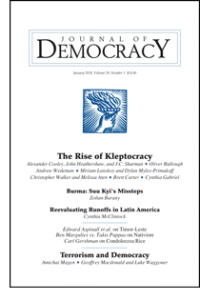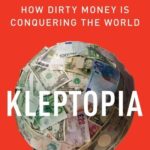 Like the passing of the seasons, the Kremlin’s playbook for malign energy activities comes around year after year. Whether it is using energy infrastructure proposals to export strategic corruption into the Transatlantic community, advancing schemes aimed at challenging Western legal norms, or engaging in disinformation campaigns to undermine Transatlantic consensus, Putin’s energy strategy is nothing if not consistently damaging, Benjamin Schmitt writes for the Center for European Policy Analysis (HT:FDD).
Like the passing of the seasons, the Kremlin’s playbook for malign energy activities comes around year after year. Whether it is using energy infrastructure proposals to export strategic corruption into the Transatlantic community, advancing schemes aimed at challenging Western legal norms, or engaging in disinformation campaigns to undermine Transatlantic consensus, Putin’s energy strategy is nothing if not consistently damaging, Benjamin Schmitt writes for the Center for European Policy Analysis (HT:FDD).
The sheer scale of dirty money flooding U.S.-led financial systems from kleptocracies like Equatorial Guinea makes existing asset-recovery programs ineffective at deterring the theft of State wealth and corresponding repression by kleptocrats, adds analyst Ian J. Lynch. A critical mass of American policymakers is beginning to seriously confront the central role that lax financial regulation plays in enabling kleptocrats and human rights abusers, he writes for Just Security.
While strategic corruption is not a new phenomenon, it has become more widespread and sophisticated with the rise of offshore financial centers and the growing assertiveness of authoritarian leaders who embrace these unsavory tactics to project power and wield influence. And they are increasingly targeting the United States and other democracies, says a new report from the Center for American Progress.
 The most well-documented examples of both strategic corruption and kleptocracy are the Russian government’s influence operations in Eastern European states, which revolve around patronage networks and economic relationships that produce pro-Russian political tendencies and dependence on Russia. But Russia is not alone. In China, the Chinese Communist Party’s de facto control over virtually all Chinese political and business elites has allowed it to control strategically sensitive infrastructure in Sri Lanka, Ecuador, and Malaysia, Trevor Sutton and Simon Clark write in “The Treasury Department Should Lead the Fight Against Corruption and Kleptocracy.”
The most well-documented examples of both strategic corruption and kleptocracy are the Russian government’s influence operations in Eastern European states, which revolve around patronage networks and economic relationships that produce pro-Russian political tendencies and dependence on Russia. But Russia is not alone. In China, the Chinese Communist Party’s de facto control over virtually all Chinese political and business elites has allowed it to control strategically sensitive infrastructure in Sri Lanka, Ecuador, and Malaysia, Trevor Sutton and Simon Clark write in “The Treasury Department Should Lead the Fight Against Corruption and Kleptocracy.”
The report urges U.S. officials to reproduce the successful efforts that strengthened the global response to terrorist financing, and makes several recommendations:
- Form an interagency task force and issue a new national strategy to combat the most dangerous forms of corruption.
- Restructure the Office of Terrorism and Financial Intelligence to better address a broader range of threats, including corruption.
- Increase resources to the Financial Crimes Enforcement Network.
- Strengthen the use of existing authorities, such as the Global Magnitsky Act and Section 311 of the USA PATRIOT Act.
- Pursue legislative and regulatory measures that increase the transparency of the U.S. economic system.
- Elevate corruption-related threats within the National Intelligence Priorities Framework.
- Strengthen multilateral engagement on corruption-related intelligence and economic sanctions.
 “The United States needs to develop a strategy to prevent, identify, and sanction strategic corruption and kleptocracy so it can protect its own political system from foreign interference and help strengthen global democracy,” said Simon Clark, a senior fellow at CAP. “The Treasury Department, along with other stakeholders, should adjust and restructure its approach to combating illicit finance to put greater emphasis on the use of dirty money by geopolitical adversaries.”
“The United States needs to develop a strategy to prevent, identify, and sanction strategic corruption and kleptocracy so it can protect its own political system from foreign interference and help strengthen global democracy,” said Simon Clark, a senior fellow at CAP. “The Treasury Department, along with other stakeholders, should adjust and restructure its approach to combating illicit finance to put greater emphasis on the use of dirty money by geopolitical adversaries.”
The Overlooked Intersection of Social Media and Kleptocracy https://t.co/nJxUpe9wKY via @just_security
— Democracy Digest (@demdigest) December 10, 2020







